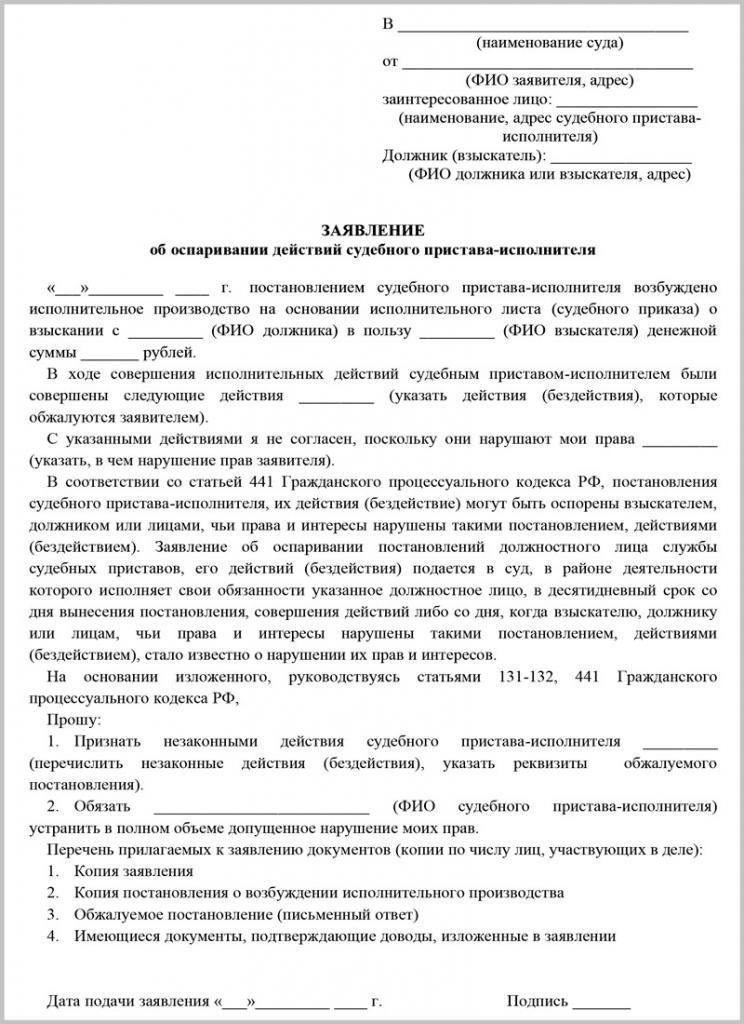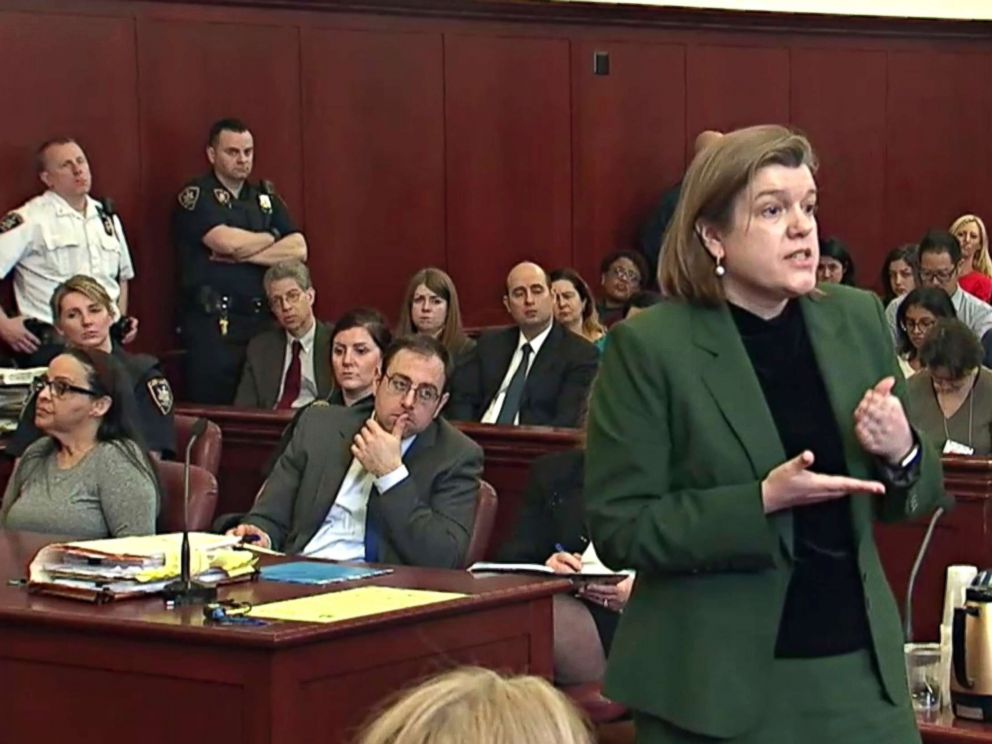Administrative claim for the action of a bailiff is a way to protect your rights. The law provides for two more, but going to court is considered the most promising and effective. How to act to the applicant, on what legal norms to rely?
Normative regulation
In the Russian Federation, two laws have been adopted that govern the activities of bailiffs:
- "On Enforcement Proceedings."
- "On bailiffs."
The central apparatus of the service takes orders, instructions, other acts that clarify the provisions of laws and supplement them.

A significant role is played by the RF Armed Forces' PP, dedicated to the application by the courts of the norms that judges most often encounter in their work.
The process of filing an administrative statement of claim for the actions of the bailiff is described in CAS. Since 2015, all complaints of citizens against bailiffs in court are examined according to the norms of this code.
Organizations and entrepreneurs who are confronted with bailiffs are guided by the rules of the agro-industrial complex in their business activities, from the section appeal against actions and omissions of authorities, normative and normative acts.
To use other means
The law gives the right to choose whether to turn to the prosecutor's office, to a higher bailiff, or to a court.
The difficulty lies in the fact that the law establishes limited time limits for appealing against the actions of officials of state and municipal authorities. In total, 10 days are given from the moment the decision is made, or from the moment it became known about it.
Russian procedural codes do not contain rules that would preserve or extend the time limit for applying to a court, provided that a timely appeal is made out of court. If a lawsuit is filed simultaneously with a complaint to a senior bailiff or prosecutor, then proceedings on them are suspended. The actions and decisions of the court have priority.
An administrative statement of claim for a bailiff is a more effective option. After all, the judge has no interest in hiding his mistakes. There are cases of cancellation by bailiffs due to the fact of going to court. The plaintiff will be surprised, but at the first meeting the representative of the service may well state the groundlessness of the statement, since his requirements have already been satisfied.
What to complain about
What circumstances are the reasons for the complaint? An administrative statement of claim for the actions of a bailiff is filed for a number of reasons. The law does not limit citizens in the subject of the complaint, that is, there are no circumstances that the court will not consider. Among them:
- unreasonable refusal to open production;
- unjustified closure of production;
- unreasonably slow actions of the bailiff;
- complete inaction in taking action;
- the methods used by the bailiff in the course of the work violate the rights and interests of citizens.
The presented list is general. When filing a complaint, the applicant should indicate what exactly is a violation of the law and its rights.

For example, the bailiff refuses to take measures in order to seize property from the debtor's actual home. Such actions require a preliminary appeal to the court and careful preparation for the meeting.
Is it worth complaining
The legislation is not always able to solve the tasks facing it, and the bailiff, respectively, also. The reason for the non-enforcement of the court decision is often not in the actions of the bailiff, but in the circumstances of the case.For example, not every violator is allowed to temporarily deprive of rights, not every person who maliciously evades payments will open a criminal case.
Before filing an administrative lawsuit against the actions of the bailiff, it is necessary to find out whether the official really violates the law, and whether it is realistic to help him. It is easier for the bailiff to work if the applicant provides additional information that cannot be obtained from official sources.
Thus, violations by the bailiff may be unintentional and occur due to circumstances beyond his control.
Which court to send papers to
Entrepreneurs and commercial organizations submit documents to the arbitration court of their region or at the place of execution of the judicial act, if the decision was made in another entity.

Where to turn to a simple citizen? CAS divides cases between district and world courts. World justice deals exclusively with the issuance of court orders, and the lawsuit against the actions of the bailiff, without exception, is in all cases referred to the district (city) court.
Terms of circulation
Regarding the complaint against bailiffs, the law has a special clause on the 10-day appeal period. Regarding other complaints about the bailiff: if they were submitted to the head or the prosecutor's office, then a delay in their consideration or evasion of the proceedings on them is considered a good reason for missing the deadline.

If for some reason he was missed, a request for its extension is formulated in a lawsuit or in a separate statement attached to him. Mandatory reference to the reasons that the plaintiff considers valid.
The absence of a request to restore the term gives the court the right to refuse a substantive action against the bailiff. And then again not to file a complaint.
Form and content of the claim
In CAS, the requirements for processing the application are placed in two articles: one describes the general requirements (Article 125), the second (Article 220) supplements it, expanding the list.
- name of the court to which the documents were transferred;
- Full name of the plaintiff in full or name of organization, registration data;
- place of residence or location, date and place of birth;
- full name of the department of the FSSP and F. I. O. of the official of the FSSP;
- name, number, date of adoption of the document that is disputed;
- a description of the official’s inaction (what actions he evades from, and what duties he does not perform);
- other data that can complement the picture of the violation;
- information about the executive document in connection with which there is inaction;
- rights, freedoms and legitimate interests violated by the defendant, or which may be violated;
- normative acts confirming the fact of violation;
- indication of the filing of other complaints (to the prosecutor's office or senior bailiff);
- requirements to declare an action or omission unlawful;
- inventory of copies of attached documents;
- receipt of payment of state duty;
- date and signature.
application
Documents confirming the facts set forth in it are attached to the lawsuit against the court bailiff. If it is not possible to provide them independently, the application for the collection of materials by the court is attached to the application or to it.

At least two sets of documents are submitted to the court: one for the judge, the second for the defendant.
Citizens or organizations without state authority have the right to send a claim to the defendant on their own. And then papers confirming the fact of sending the claim and copies of the attached documents are sent to the court.
E-justice
Since 2017, the right has been granted to file claims by filling out a form on the court’s website, and scanned copies of documents are also uploaded there. If the plaintiff wants interim measures applied, he will have to assure the validity of the documents with an enhanced digital signature.
Preparation for business
The judge, before opening proceedings on the case, checks the claim for compliance with the form and content.Having revealed violations, he leaves the statement without movement. The plaintiff is given time to correct them. If you do not have time in the allotted time, the claim is returned. Then, given the missed deadlines, it will be difficult to file without receiving a refusal from the judge.

Administrative action against the actions of the bailiff, sent via the electronic system, can also be left without movement.
Consideration Features
The law obliges the judge to make a decision no later than 10 days after the transfer of materials to the court. For proceedings in complex cases, the extension of the term up to 1 month by the chairman of the court is allowed.
The court has the right to make a decision without the participation of representatives of the parties if it is not, in his opinion, necessary. Thus, the dispute can be resolved in one sitting.
The law establishes a mandatory list of circumstances to be considered by a court:
- whether there has been a violation of rights, freedoms and interests;
- Have the deadlines been met?
- whether the bailiff’s decision was made within his authority;
- whether the procedure for making an appropriate decision has been followed;
- whether there were grounds for making the contested decision;
- whether the adopted bailiff act complies with regulatory documents.
Enforcement of Judicial Act
The judicial act, which satisfied the claim, does not come into force immediately, but after a month. What is the duration of a lawsuit against bailiffs, or rather, its result? The goal is to achieve certain actions from the official. No one has canceled the responsibility for the failure of officials to execute court decisions. This is the main difference between judicial acts and decisions of other authorities and officials.
How to write a lawsuit
A sample of an administrative lawsuit against a bailiff is just the foundation. The applicant is left to use it by writing his own version. How difficult is it? It all depends on the circumstances. It’s one thing - an illegal refusal to open a production, a completely different situation - to appeal against the direction of the property for bidding and all related manipulations.

If you invite a representative, he must have a law degree. Otherwise, documents with his signature will not be accepted.
Finally
A lawsuit against a bailiff is a form of protection by citizens of their rights. It is considered the most effective, but also the most complex. Preparing a lawsuit is not so simple. According to the same complaint, the bailiffs are obliged to independently study the materials, like the prosecutors. The judge is based on the fact that he was first provided by the plaintiff.
The above describes additional requirements for applications submitted to officials, and in particular bailiffs, and describes the features of the proceedings on them.
